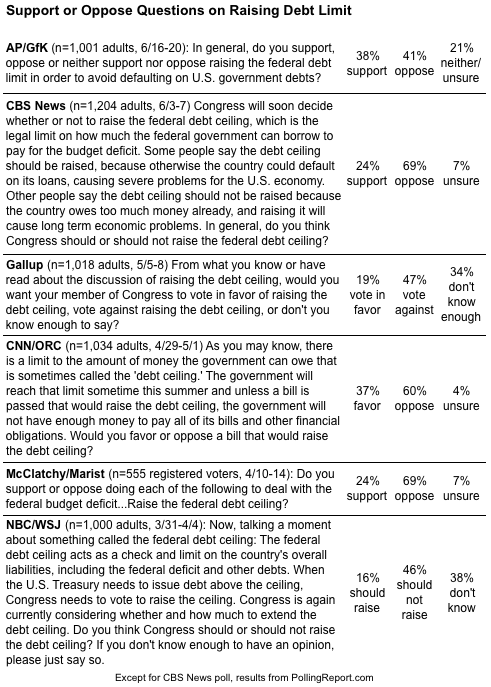I go out for a run and a swim, and the debt negotiations break down. That will teach me.
I can’t be sure, but based on the dueling press announcements as well as some of my own contacts, here’s what I suspect – and I stress that this is largely speculation – happened between the time of my last post and the dueling announcements from Boehner and Obama that a debt deal was off – at least until 11 a.m. tomorrow (Saturday). First, let’s hear both sides of the story, beginning with the President. Here is what Obama said he was offering when Boehner called him to say he was walking away from the talks: “What we said was give us $1.2 trillion in additional revenues, which could be accomplished without hiking taxes — tax rates, but could simply be accomplished by eliminating loopholes, eliminating some deductions and engaging in a tax reform process that could have lowered rates generally while broadening the base.”
Now, here is Boehner’s version: “[A]n agreement had been reached” earlier in the week that included about $800 billion in new revenue (but not through increases in tax rates). However, the White House on Thursday “moved the goal post” by insisting on an additional $400 billion in tax increases, which Boehner refused to accept. “I take the same oath of office as the president…to do what is in the best interest of our country,” Boehner said. “And it’s not in the best interest of our country to raise taxes in this economy.”
Translation: As I suggested in several posts, the framework of a deal that included additional revenue (of about $800 billion it seems), by closing tax loopholes, eliminating exemptions but not based on raising tax rates, had been negotiated between Obama and Boehner, but when Obama went back to Reid and the Senate Democrats with the plan, they balked and demanded more revenues before they would sign on. When Obama came back with the request for an additional $400 billion, Boehner walked away.
So, is the U.S. going to default on its debts? Nonsense. At this point it is clear that Boehner has decided to cut out the middleman – that would be the President – and deal directly with the people who actually wield power in this negotiation – that would be Senate Democrats. Obama will sit on the sidelines and accept what he can get to avoid a debt default. As he stated a few hours ago: “So they will come down here at 11:00 a.m. tomorrow. I expect them to have an answer in terms of how they intend to get this thing done over the course of the next week. The American people expect action.”
And they will get it, almost certainly in the form of a short-term agreement that avoids default but puts off any “grand bargain” for the time being. One possibility is some version of the McConnell plan which essentially gives Obama the power to raise the debt limit, but allows Republicans to go on record opposing it. I don’t think that’s going to fly with the Tea Party caucus, however. It’s far more likely that we will get a short-term agreement to raise the debt ceiling that Obama will reluctantly sign, with some indications suggesting long-term negotiations are in the works (which may even be true).
A couple of things to keep in mind here. First, the media will play up the impending catastrophe of a debt default – it’s in their interest to do so. But don’t mistake that for an accurate assessment of the possibility that this will happen. Second, when parties declare they are walking away from the endgame of negotiations, that’s often when agreement is most likely to happen. These negotiations aren’t over by a long shot.
More in the morning.





